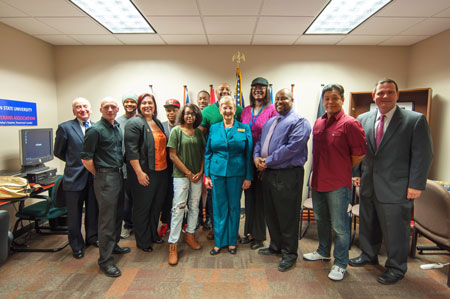Clayton State Veterans Share Personal Stories with Georgia’s First Lady

Morrow, GA—On any given night, nearly 50,000 veterans nationwide are homeless, and according to United Way,they account for more than 21 percent of the homeless population in Atlanta. At one point, Clayton State University student Devron Ward, a Desert Storm veteran, fell into that category, but he says things changed when he became involved with the University’s Veterans Resource Center (VRC).
Sharing his story with Georgia’s First Lady, Sandra Deal, Tuesday, Nov. 17, Ward discussed how after four years with the Army his life spiraled downhill once he was no longer enlisted.
“The Veterans Resource Center really helped me to transition after I got out of the Army. I was homeless, and they really took care of me. They helped me with housing, and clothes if I needed it, and food. I can’t say enough about them,” says Ward who is also a third generation war-time veteran enrolled in legal studies.
Deal was at Clayton State to show her support for the military and veterans—something she says she does annually at colleges around Georgia to express her gratitude.
“Thank you for serving. It gives you a certain amount of pride to know you’ve served your country, and we appreciate all of you. I didn’t serve, but my husband served, and I was right there with him,” says Deal referring to her husband, Governor Nathan Deal who enlisted in the Army before getting into politics.
Navy veteran Paul Sapp, also a Clayton State student, says it feels good to have Deal’s support.
“I’m very appreciative of her taking the time to visit us, and it feels really good to know that she cares about Georgia’s veterans."
Currently, the University’s VRC assists over 500 military servicemen and women and about 200 military dependents. It has one of the largest veteran populations in the state, and it’s one of 23 campus centers throughout the University System of Georgia (USG) established to support returning veterans. Under some college programs, military experience does count as course credit.
"I'm pursuing a Homeland Security degree, which is a Bachelors of Applied Science (BAS) program, and it's my understanding that I'm the first student at Clayton State to get into the BAS program using my military experience as course credit," says Clayton Whitman, who served in the Navy for six years.
Deal says being able to include that experience is essential.
“My husband really pushed for experience in the military to count towards their college or technical credit. That’s a very important thing.”
Across the state, veterans resource centers help military service members transition into higher education seamlessly by offering initiatives such as workforce integration programs, financial assistance, group support services, family support services, and even passing along educational benefits to their spouses and children. Clayton State officials say they’re thankful for Deal’s advocacy.
“It’s a huge honor to have the support from Mrs. Deal and the Governor’s Office for college veterans pursuing their educational goals,” says Maria Adams, Veteran Resource Coordinator.
Just last month, Military Advanced Education & Transition magazine announced that Clayton State was chosen as a Top School in the 2016 MAE&T Guide to Colleges and Universities. Institutions are evaluated on their military culture, financial aid, flexibility, on-campus support and online support services. That guide comes out in December.